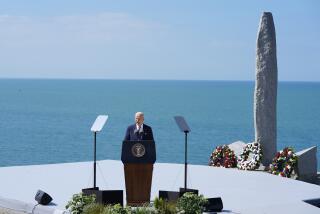Facing Up to a Hard Reality
- Share via
President Bush’s speech Sunday night amounted to a tacit admission of the mistakes that have riddled the occupation of Iraq. But if Bush is to justify the breathtaking $87-billion price tag he proposed for rebuilding Iraq and Afghanistan, he needs to provide Congress with more than vague assurances about bringing democracy to the Middle East.
Bush’s strongest argument is that, since 9/11, Americans must be ready to “engage the enemy where he lives,” lest the war against terrorism play out here. It’s not what the administration is attempting to do in Iraq but how badly it is doing it that is so distressing. However welcome the removal of Saddam Hussein and his sons was, the steady spate of attacks against U.S. and coalition forces in Iraq shows that the administration wildly underestimated the costs and dangers of imposing its headstrong will in Iraq. It ignored experts who warned that failure to quickly provide to the Iraqi people the basics -- like electricity and water -- would make them wonder why U.S.-style democracy was superior to Hussein’s efficient tyranny. The Iraqi resentment has only grown.
A harbinger of present troubles came in March when four U.S. soldiers were killed in the war’s first suicide bombing. More recently, a truck filled with explosives destroyed the United Nations compound in Baghdad, a Shiite leader and dozens of his followers were blown up and the Baghdad police station was bombed. The administration is scrambling to prevent Iraq from descending into chaos.
Bush rightly emphasized that the United States cannot retreat in the face of such attacks. He invoked the memories of Beirut and Somalia, situations in which American presidents, in the eyes of the Arab world, cut and run after U.S. troops were attacked. Such actions may well have led Osama bin Laden and his followers to believe that the U.S., as Bush put it, had become “decadent.”
Now that some 140,000 American troops have proven inadequate to police Iraq, the president has to come back to international allies like France and Germany, which the administration once derisively referred to as “chocolate makers,” to help rescue Iraq. Despite administration efforts to portray the war as a multinational effort, six out of seven military personnel now in Iraq are Americans.
Bush was right to state that the United States and its allies “cannot let past differences interfere with present duties.” The Iraq mess may be of Bush’s own making, but neither Democrats at home nor allies abroad can seriously wish for the situation to deteriorate further. The president said he was determined that the U.S. would not run, and indeed this nation has the moral obligation to finish what it started and hand Iraq back to the Iraqis. Then, perhaps, the dream of taxpayer dollars building new schools, roads and medical clinics can be one that can be afforded not just in Iraq but in the United States.
More to Read
Get the L.A. Times Politics newsletter
Deeply reported insights into legislation, politics and policy from Sacramento, Washington and beyond. In your inbox twice per week.
You may occasionally receive promotional content from the Los Angeles Times.










